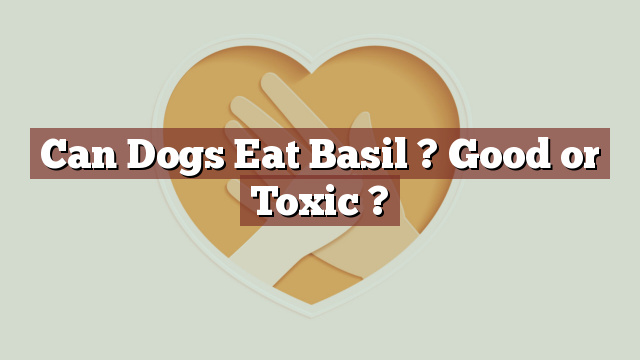Can Dogs Eat Basil? Good or Toxic?
As responsible pet owners, it is crucial to be aware of what foods are safe for our furry friends. Can dogs eat basil? This is a common question many dog owners have when considering adding herbs to their pet’s diet. In this article, we will explore the safety and potential risks or benefits of feeding basil to dogs.
Nutritional Value of Basil: Vitamins, Minerals, and Antioxidants
Basil is an herb that is often used in cooking to add flavor and aroma to various dishes. It is rich in essential nutrients, including vitamins, minerals, and antioxidants. This herb contains vitamins A, C, and K, as well as minerals such as calcium, iron, and magnesium. Additionally, basil is known to possess powerful antioxidant properties that can help protect the body against free radicals.
Can Dogs Eat Basil? Exploring Safety and Toxicity
Yes, dogs can eat basil. Basil is generally safe for dogs to consume in small amounts. However, it is important to note that some dogs may have individual sensitivities or allergies to certain foods, including herbs like basil. Therefore, it is always a good idea to introduce new foods gradually and monitor your dog for any adverse reactions.
Scientific and veterinary insights suggest that basil is not toxic to dogs. In fact, some pet owners have found that incorporating small amounts of basil into their dog’s diet can have potential health benefits.
Potential Risks or Benefits of Feeding Basil to Dogs
Feeding basil to your dog in moderation can offer some potential health benefits. The vitamins and minerals present in basil can contribute to your dog’s overall well-being. For example, vitamin A promotes good vision, vitamin C supports a healthy immune system, and vitamin K aids in proper blood clotting. The antioxidants found in basil can also help protect against cellular damage and reduce inflammation.
However, it is essential to remember that basil should only be given as an occasional treat or addition to your dog’s regular diet. Feeding large amounts of basil or any other herb to your dog may cause digestive upset, including vomiting or diarrhea. Additionally, some herbs, including basil, may interact with certain medications, so it is advisable to consult with your veterinarian before introducing new foods into your dog’s diet.
What to Do If Your Dog Eats Basil: Signs, Precautions, and Treatment
If your dog accidentally consumes a large amount of basil or displays unusual symptoms after eating basil, it is important to take appropriate action. Some dogs may be more sensitive to certain foods, and excessive intake of basil could lead to digestive issues.
If your dog experiences vomiting, diarrhea, or any other signs of discomfort after consuming basil, it is recommended to withhold food temporarily and provide plenty of fresh water. Monitor your dog closely for any changes in behavior or worsening symptoms. If the symptoms persist or worsen, it is best to consult your veterinarian for further guidance and treatment.
In Conclusion: Moderation and Consultation for Feeding Basil to Dogs
In conclusion, while dogs can eat basil, it is important to remember that moderation is key. Basil can provide some nutritional benefits and antioxidants to your furry friend, but it should only be given in small amounts. Always monitor your dog for any adverse reactions when introducing new foods into their diet.
If you are uncertain or have any concerns about feeding basil or any other food to your dog, it is advisable to consult with your veterinarian. They can provide professional advice tailored to your dog’s specific needs and help ensure a balanced and safe diet for your beloved pet.
Thank you for investing your time in exploring [page_title] on Can-Eat.org. Our goal is to provide readers like you with thorough and reliable information about various dietary topics. Each article, including [page_title], stems from diligent research and a passion for understanding the nuances of our food choices. We believe that knowledge is a vital step towards making informed and healthy decisions. However, while "[page_title]" sheds light on its specific topic, it's crucial to remember that everyone's body reacts differently to foods and dietary changes. What might be beneficial for one person could have different effects on another. Before you consider integrating suggestions or insights from "[page_title]" into your diet, it's always wise to consult with a nutritionist or healthcare professional. Their specialized knowledge ensures that you're making choices best suited to your individual health needs. As you navigate [page_title], be mindful of potential allergies, intolerances, or unique dietary requirements you may have. No singular article can capture the vast diversity of human health, and individualized guidance is invaluable. The content provided in [page_title] serves as a general guide. It is not, by any means, a substitute for personalized medical or nutritional advice. Your health should always be the top priority, and professional guidance is the best path forward. In your journey towards a balanced and nutritious lifestyle, we hope that [page_title] serves as a helpful stepping stone. Remember, informed decisions lead to healthier outcomes. Thank you for trusting Can-Eat.org. Continue exploring, learning, and prioritizing your health. Cheers to a well-informed and healthier future!

